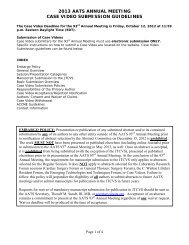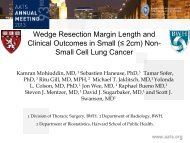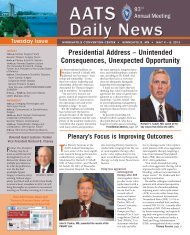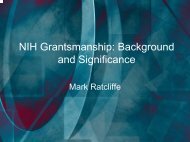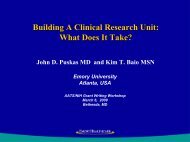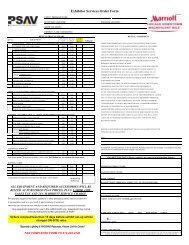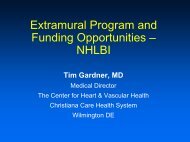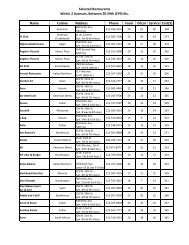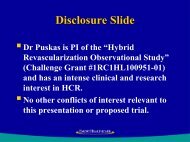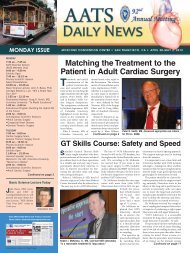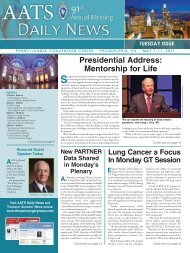Boston - American Association for Thoracic Surgery
Boston - American Association for Thoracic Surgery
Boston - American Association for Thoracic Surgery
- No tags were found...
You also want an ePaper? Increase the reach of your titles
YUMPU automatically turns print PDFs into web optimized ePapers that Google loves.
89 TH ANNUAL MEETING MAY 9–MAY 13, 2009BOSTON, MASSACHUSETTSF15. Generation of Epigenetically-Modified Autologous Tumor CellLines <strong>for</strong> Vaccines Targeting Cancer-Testis Antigens in<strong>Thoracic</strong> MalignanciesDavid S. Schrump, * Julie A. Hong, Mary Zhang, Yuwei Zhang, Tricia F. Kunst,Ana Hancox, Leandro Mercedes, King Kwong †<strong>Thoracic</strong> Oncology Section, NCI, Bethesda, MD, USAInvited Discussant: Stephen G. SwisherOBJECTIVE: Cancer-testis antigens (CTA) are highly diverse immunogenic proteinsencoded by germ cell restricted genes, which are aberrantly activated by epigeneticmechanisms in human cancers. One potential strategy to target CTAs in thoracicmalignancies involves utilization of epigenetically-modified autologous tumorlines to immunize patients against multiple CTAs that can be up-regulated in primarycancers by systemic gene induction regimens. The present study was undertakento assess the feasibility of this approach as a prelude to a phase I clinical trial.METHODS: Primary tumor tissues were harvested from 21 patients with thoracicmalignancies including 10 NSCLC, 2 SCLC, 4 EsC, 3 MPM, and 2 sarcomas, andprocessed <strong>for</strong> cell culture. Quantitative RT-PCR, western blot, and immunohistochemistry(IHC) techniques were used to assess BORIS variant, MAGE-A1,-A3,NY-ESO-1, and CT-45 expression in cell lines cultured in normal media with orwithout the DNA demethylating agent, Decitabine (DAC), the histone deacetylaseinhibitor, Depsipeptide (DP), or sequential DAC/DP. Cytokine release assays wereused to assess recognition of tumor lines by MAGE-A3 and NY-ESO-1-specificcytolytic T lymphocytes (CTL) be<strong>for</strong>e and after drug exposure.RESULTS: Primary tumor lines were successfully generated and continuouslypropagated from 12 of 21 individuals (57%), including 3 NSCLC, 2 SCLC, 3 EsC,2 MPM, and 2 sarcoma patients. Quantitative RT-PCR and IHC analysis revealedheterogeneous, time- and dose-dependent gene induction profiles in cell lines followingtreatment with DAC, DP, or sequential DAC/DP under exposure conditionsgreatly exceeding those achievable in clinical settings. Induction levels of cancertestisgenes frequently approximated or exceeded those observed in control testes,as well as thresholds <strong>for</strong> CTL recognition in cultured cancer lines.CONCLUSION: Generation of autologous epigenetically-modified cancer linesfrom thoracic oncology patients is feasible. These data support phase I evaluationof epigenetically-modified autologous tumor cell vaccination as a means to broadlyimmunize thoracic oncology patients against a variety of potentially relevant CTAsthat can be targeted using gene induction protocols.* AATS Member† Second John Alexander Research Scholarship 2004144



